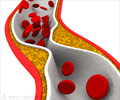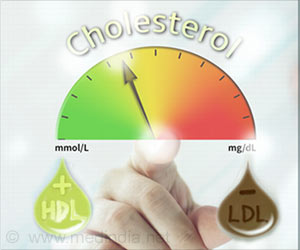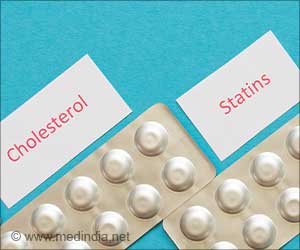Fearing that gorging on chocolate cake and juicy beef roast might send your blood cholesterol levels sky high? Well then here's your ultimate saviour- synthetic high-density lipoprotein (HDL).
You've probably dreamed of the perfect world where gorging on chocolate cake and juicy beef roast will leave your "bad cholesterol" levels untouched? That 'dream' can now be reality with synthetic high-density lipoprotein (HDL).
Scientists at Northwestern University have designed synthetic HDL, the "good" cholesterol, which could help fight chronically high cholesterol levels and the resulting deadly heart disease.The researchers have shown that their nanoparticle version of the is a promising new weapon to bind cholesterol irreversibly.
The synthetic HDL, based on gold nanoparticles, is similar in size to HDL and mimics HDL's general surface composition.
"We have designed and built a cholesterol sponge. The synthetic HDL features the basics of what a great cholesterol drug should be," said Chad A. Mirkin, George B. Rathmann Professor of Chemistry in the Weinberg College of Arts and Sciences, who led the study with Shad Thaxton, M.D., assistant professor of urology in Northwestern's Feinberg School of Medicine
He added: "Drugs that lower the bad cholesterol, LDL, are available, and you can lower LDL through your diet, but it is difficult to raise the good cholesterol, HDL. I've taken niacin to try and raise my HDL, but the side effects are bad so I stopped. We are hopeful that our synthetic HDL will one day help fill this gap in useful therapeutics."
To create synthetic HDL the researchers started with a gold nanoparticle as the core, which was then layered on a lipid that attaches to the gold surface, followed by another lipid and last a protein, called APOA1.
Advertisement
The final high-density lipoprotein nanoparticles are each about 18 nanometers in diameter, a size similar to natural HDL.
Advertisement
Mirkin said: "HDL is a natural nanoparticle, and we've successfully mimicked it. Gold is an ideal scaffolding material - it's size and shape can be tailored, and it can be easily functionalized. Using gold nanoparticles, which are non-toxic, for synthetic HDL bodes well for the development of a new therapeutic."
The scientists are now planning to further study the synthetic HDL in biologically relevant conditions and measure and evaluate the cholesterol-binding properties.
The study is published online by the Journal of the American Chemical Society (JACS).
Source-ANI
TAN













